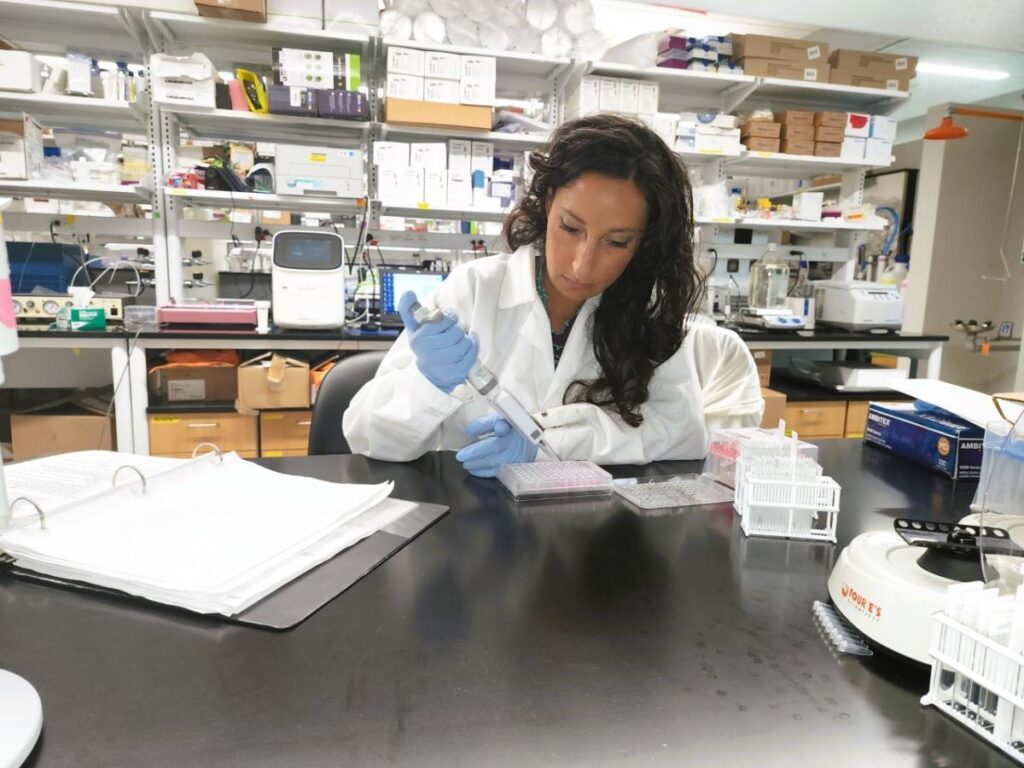BY KEVIN ROBINSON-AVILA / JOURNAL STAFF WRITER
Copyright © 2022 Albuquerque Journal

A remote-controlled, magnetic toothpaste and toothbrush that injects anti-bacterial solutions into the nooks and crannies of gums and teeth could soon hit the market, thanks to novel nanotechnology developed at the University of New Mexico.
The product is still under development, but a newly created startup company, MNT SmartSolutions LLC, is working to put it on store shelves in the next few years. Once available to consumers, it could potentially “revolutionize” the oral care industry, which has remained unchanged for as long as people can remember, according to company executives and the research team that created it.
That team, headed by nano materials engineer Leisha Armijo-Martin, includes current and former UNM biologists, toxicologists, pharmaceutical and environmental scientists and research engineers from UNM’s Center for High Technology Materials, Texas A&M University at Corpus Christi, and the University of Bristol Dental School in England.
The team wants to create a combination toothpaste and toothbrush package that offers an interactive, nanotech-powered, home dental-care solution for shoppers that sits alongside Crest, Colgate and the like, Armijo-Martin said.
“This could replace today’s toothpaste on store shelves, where we’ve seen the same toothpaste and toothbrushes for 50 to 100 years,” Armijo-Martin told the Journal. “It would be a smart, interactive toothpaste and toothbrush that shoppers could choose as they walk down the aisles.”
Nanotechnology
The product is based on non-toxic, environmentally friendly nano particles that, when combined with iron oxide, have both highly-magnetic and anti-bacterial properties, Armijo-Martin said. That nano material is the “secret sauce” that goes into the toothpaste, which is then brushed as normal across the teeth and gums.
The toothbrush, however, is designed to create a remote-controlled electromagnetic field that can be turned on and off. Once turned on, it pulls the nano particles imbedded in the toothpaste down into the gums, cavities, and hard-to-reach crevices between teeth.
Once applied, the anti-microbial elements immediately attack bacteria and plaque formation in the mouth, with additional, sustained-release effects that target infected areas.
The remote-control toothbrush remains off until after the toothpaste is applied to teeth to avoid the magnetic balls in the nano material from bunching up together before brushing.
“You switch off the remote while the toothpaste is in the tube, and while it’s brushed onto teeth,” Armijo-Martin said. “Then you turn it on for the electromagnetic field to pull the nano particles down below the gum lines and along the teeth to reach previously unreachable areas.”
The nano particles specifically target bad bacteria.
“People like to use mouthwash like Listerine, but that kills everything, including good bacteria,” Armijo-Martin said. “This will preferentially attack only the bad bacteria.”
That targeted impact comes from polymer coating imbedded on the surface of the nano particles. The coating is similar to the chemistry found in bad bacteria, which naturally produces a plastic film to protect its colonies.
“By engineering magnetic particles with similar chemistry, the nano particles are attracted to the bacterial biofilm that builds up,” Armijo-Martin said. “And they stay there as they release anti-microbial compounds to create a lasting effect.”
Armijo-Martin discovered the anti-bacterial potential of the magnetic nano particles while working to develop them as a courier for targeted medicine to deliver drugs directly to infections.
“We found the nano particles had their own anti-bacterial qualities,” she said.
That led to a research pivot to instead study direct use of the particles against bacteria, both to prevent and treat infection.
The technology could also be applied as a topical and internal anti-bacterial treatment for wounds, abrasions and infections. But MNT SmartSolutions is focusing first on the dental industry, which offers a huge market with potential for broad impact to prevent and treat periodontal disease, gingivitis and cavities.
Periodontitis is a chronic inflammatory condition stemming from the persistence of bacterial biofilm infections, or dental plaque, that’s considered the 11th most prevalent disease in the world. Apart from tooth loss, it’s been linked to many other health problems, including cardiovascular disease, diabetes and cancer.
Direct consumer sales
The company will offer its technology directly to orthodontists, but its biggest impact could be on the direct consumer market.
“People don’t like to have their gums scraped,” Armijo-Martin said. “It’s painful and costly. With this, they can do it on their own at home to prevent tooth decay and gum disease.”
So far, lab testing on cells with bacterial cultures, plus toxicity testing on human mammalian cells, have shown the technology is effective and safe.
In May, the company received a first-phase, $256,000 National Science Foundation grant to begin mouse trials, said MNT SmartSolutions Chief Financial Officer John Chavez.
“We’ve done all the bench work through in-vitro testing,” Chavez told the Journal. “The NSF funding allows us to move on to control tests with mice. That work started in June.”
When the mice trials conclude, MNT will seek a second-phase NSF grant to conduct more testing with other animals, before moving on to human clinical trials to achieve U.S. Food and Drug Administration approval, Chavez said.
The full process could take four or five years before the technology can move to market.
MNT is one of 15 local companies formed by the New Mexico Startup Factory, which launched 10 years ago to commercialize new technologies from the state’s research universities and national laboratories. Chavez is president of the Startup Factory, which recently signed a license agreement to market the MNT technology with UNM’s Rainforest Innovations, which manages all of the university’s tech-transfer and economic development programs.
Chavez sees huge potential for MNT.
“We have a cadre of highly experienced researchers in the oral-care world from New Mexico, Texas and England working on this,” Chavez said. “The dental care industry offers a huge market for new products, because it hasn’t had a lot of modern innovation in many years.”

